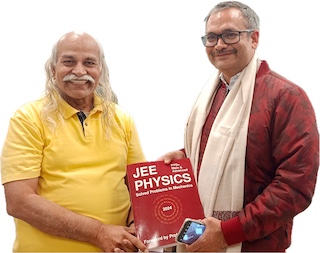Three pole magnet
Everyone knows that a permanent magnet has two poles, north pole and south pole. Their strengths are supposed to be same. Some texts go further stating that for a bar magnet, the ``magnetic length'' is 0.84 of the physical length of the magnet. However all this can be very different depending on how you magnetize the bar. In this experiment, you will make a magnet that will have three poles, instead of two.
Making a three pole magnet
You need a bicycle spoke, two bar magnets, a compass.
- Place the bicycle spoke on horizontal surface and hold it tight.
- Take two bar magnets in two hands, both north poles (or both south poles) down. Put then in contact with the spoke at the middle.
- Pressing the magnets against the spoke, slide them on the spoke so that the magnets reach opposite ends of the spoke. Your 3-pole magnet is ready.
- Place a compass on the surface and bring one end of the spoke near the compass. Which end of the compass is attracted to the spoke?
- Now bring the other end of the spoke close to the compass. Which end of the compass sets attracted to the spoke? Is it the same end which is attracted to both ends of the spoke.
- Now bring the middle portion of the spoke close to the compass. See that the compass deflects. Which end of the compass gets attracted to the spoke?
- Is the pole appearing the middle of the spoke similar or opposite to the poles at the end?
Magnetic field of a three pole magnet
A magnet has two poles, north and south. The `three pole magnet' is an assembly of two bar magnets with similar poles connected end-to-end. The two sides of assembly have same pole but middle one has different. This can be used to dramatize the things. Take two strong magnets (preferably cylindrical) and tight-fit them inside a rubber/PVC pipe. Ask a student to find location and type of poles of this assembly.
Magnetic field line gives the direction of magnetic field at the points from which these lines are drawn. To get the magnetic field direction, one can use a small compass which rests in the direction of the resultant magnetic field (horizontal component). To get the field line due to magnet only, one should ensure that the compass needle rests along north-south direction. In this case, the torque due to the earth's magnetic field is zero.
You need a magnet, a drawing board or any board of size about 12 inch by 18 inch, a compass, two A4 size paper sheets or an A3 paper sheet, two wooden stands with a long thread tying both, cellophane tape
You have to draw magnetic field lines for the given magnet. Place the paper sheet on the board and fix the corners using the tape. Put the two wooden stands with thread stretched between them at sufficient distance so that the drawing board can easily rotate under the thread. Place the magnet in the middle and tape it.
Draw 8 field lines starting from one end of the magnet, 4 on each side of it. Make sure, you make the compass in north south direction before marking the end positions to avoid torques from earth's magnetic field.
Related
Subscribe to our channel
